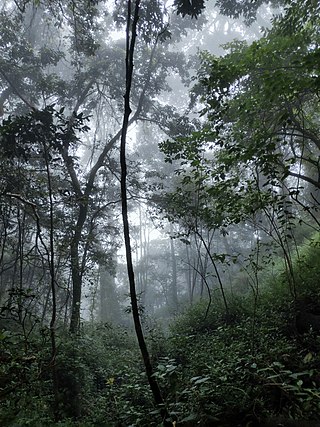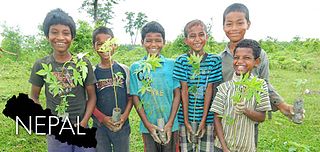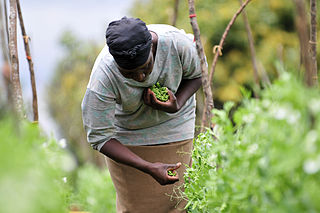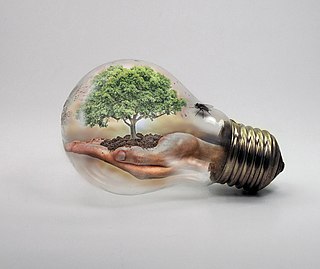The United Nations Development Programme (UNDP) is a United Nations agency tasked with helping countries eliminate poverty and achieve sustainable economic growth and human development. The UNDP emphasizes developing local capacity towards long-term self-sufficiency and prosperity.

The Global Environment Facility (GEF) is a multilateral environmental fund that provides grants and blended finance for projects related to biodiversity, climate change, international waters, land degradation, persistent organic pollutants (POPs), mercury, sustainable forest management, food security, and sustainable cities in developing countries. It is the largest source of multilateral funding for biodiversity globally, and distributes more than $1 billion a year on average to address inter-related environmental challenges.

International development or global development is a broad concept denoting the idea that societies and countries have differing levels of economic or human development on an international scale. It is the basis for international classifications such as developed country, developing country and least developed country, and for a field of practice and research that in various ways engages with international development processes. There are, however, many schools of thought and conventions regarding which are the exact features constituting the "development" of a country.
The Green Belt Movement (GBM) is an indigenous grassroots organization in Kenya that empowers women through the planting of trees. It is one of the most effective and well-known grassroots organisations addressing the problem of global deforestation. Professor Wangari Maathai established the organization in 1977 under the auspices of the National Council of Women of Kenya (NCWK). GBM's successes in forest conservation, education, and women's economic empowerment have gained the organisation worldwide acclaim. It is also noted for its advocacy of human rights, democratisation of access to public lands, and environmental justice issues such as the role of women's traditional ecological knowledge in addressing environmental degradation and desertification.

Sustainable forest management (SFM) is the management of forests according to the principles of sustainable development. Sustainable forest management has to keep the balance between three main pillars: ecological, economic and socio-cultural. The goal of sustainable forestry is to allow for a balance to be found between making use of trees and also maintaining natural patterns of disturbance and regeneration. The forestry industry mitigates climate change by boosting carbon storage in growing trees and soils and improving the sustainable supply of renewable raw materials via sustainable forest management.

Community forestry is an evolving branch of forestry whereby the local community plays a significant role in forest management and land use decision making by themselves in the facilitating support of government as well as change agents. It involves the participation and collaboration of various stakeholders including community, government and non-governmental organisations (NGOs). The level of involvement of each of these groups is dependent on the specific community forest project, the management system in use and the region. It gained prominence in the mid-1970s and examples of community forestry can now be seen in many countries including Nepal, Indonesia, Korea, Brazil, India and North America.
Velondriake, meaning “to live with the sea” in the Vezo dialect of the Malagasy language, is a locally managed marine area (LMMA). Established in 2006 in southwest Madagascar, Velondriake is home to over 7,000 resident Vezo people and covers a marine and coastal area of about 64,000 ha making it one of the largest LMMAs in the western Indian Ocean. The LMMA includes extensive coral reefs, mangroves, seagrass beds, baobab forests, spiny forest and other threatened habitats. The LMMA includes five permanent coral reef reserves, two permanent mangrove reserves, and numerous periodic fisheries closures (PFCs), primarily for octopus on reefs and for mud crab in mangroves.
Blue Ventures is a registered charity focused on nurturing locally led marine conservation. The organisation partners with coastal communities that depend on marine resources.

Climate change in Nepal is a major problem for Nepal as it is one of the most vulnerable countries to the effects of climate change. Globally, Nepal is ranked fourth, in terms of vulnerability to climate change. Floods spread across the foothills of the Himalayas and bring landslides, leaving tens of thousands of houses and vast areas of farmland and roads destroyed. In the 2020 edition of Germanwatch's Climate Risk Index, it was judged to be the ninth hardest-hit nation by climate calamities during the period 1999 to 2018. Nepal is a least developed country, with 28.6 percent of the population living in multidimensional poverty. Analysis of trends from 1971 to 2014 by the Department of Hydrology and Meteorology (DHM) shows that the average annual maximum temperature has been increasing by 0.056 °C per year. Precipitation extremes are found to be increasing. A national-level survey on the perception-based survey on climate change reported that locals accurately perceived the shifts in temperature but their perceptions of precipitation change did not converge with the instrumental records. Data reveals that more than 80 percent of property loss due to disasters is attributable to climate hazards, particularly water-related events such as floods, landslides and glacial lake outburst floods (GLOFs).

The Sustainable Development Goals (SDGs) or Global Goals are a collection of seventeen interlinked objectives designed to serve as a "shared blueprint for peace and prosperity for people and the planet, now and into the future." The short titles of the 17 SDGs are: No poverty (SDG 1), Zero hunger (SDG 2), Good health and well-being (SDG 3), Quality education (SDG 4), Gender equality (SDG 5), Clean water and sanitation (SDG 6), Affordable and clean energy (SDG 7), Decent work and economic growth (SDG 8), Industry, innovation and infrastructure (SDG 9), Reduced inequalities (SDG 10), Sustainable cities and communities (SDG 11), Responsible consumption and production (SDG 12), Climate action (SDG 13), Life below water (SDG 14), Life on land (SDG 15), Peace, justice, and strong institutions (SDG 16), Partnerships for the goals (SDG 17).

Climate change affects men and women differently. Climate change and gender examines how men and women access and use resources that are impacted by climate change and how they experience the resulting impacts. It examines how gender roles and cultural norms influence the ability of men and women to respond to climate change, and how women's and men's roles can be better integrated into climate change adaptation and mitigation strategies. It also considers how climate change intersects with other gender-related challenges, such as poverty, access to resources, and unequal power dynamics. Ultimately, the goal of this research is to ensure that climate change policies and initiatives are equitable, and that both women and men benefit from them. Climate change increases gender inequality, reduces women's ability to be financially independent, and has an overall negative impact on the social and political rights of women, especially in economies that are heavily based on agriculture. In many cases, gender inequality means that women are more vulnerable to the negative effects of climate change. This is due to gender roles, particularly in the developing world, which means that women are often dependent on the natural environment for subsistence and income. By further limiting women's already constrained access to physical, social, political, and fiscal resources, climate change often burdens women more than men and can magnify existing gender inequality.

The Millennium Development Goals Achievement Fund (MDG-F) was an international cooperation mechanism committed to eradicating poverty and inequality and to accelerating progress towards the Millennium Development Goals (MDGs) worldwide. Its aim was to improve livelihoods and to influence public policy, which made it responsive to the needs of the poorest populations.

Women's empowerment may be defined in several ways, including accepting women's viewpoints, making an effort to seek them and raising the status of women through education, awareness, literacy, and training. Women's empowerment equips and allows women to make life-determining decisions through the different societal problems. They may have the opportunity to re-define gender roles or other such roles, which allow them more freedom to pursue desired goals.
SEED is a global partnership for action on sustainable development and the green economy. It was initiated in 2001 by the German Federal Ministry for the Environment, Nature Conservation, Building and Nuclear Safety (BMUB). Under the name SEED Initiative it was presented as an “Example of Excellence” partnership inter alia by UNEP and BMUB at the Johannesburg World Summit on Sustainable Development in 2002 where it was also registered by the United Nations Environment Programme (UNEP), the United Nations Development Programme (UNDP), and the International Union for Conservation of Nature (IUCN) as a Type II Partnership. SEED was originally conceived as an acronym for Supporting Entrepreneurs for Environment and Development.

Action for Climate Empowerment (ACE) is a term adopted by the United Nations Framework Convention on Climate Change (UNFCCC). It refers to Article 6 of the Convention's original text (1992), focusing on six priority areas: education, training, public awareness, public participation, public access to information, and international cooperation on these issues. The implementation of all six areas has been identified as the pivotal factor for everyone to understand and participate in solving the complex challenges presented by climate change. The importance of ACE is reflected in other international frameworks such as the Sustainable Development Goals ; the Global Action Programme for Education for Sustainable Development ; the Aarhus Convention (2011); the Escazú Agreement (2018) and the Bali Guidelines (2010).

The Youth Café is a not-for profit pan-African youth organization that was founded in 2012 and works with young people in Africa and around the world to foster community resilience, propose innovative solutions, drive social progress, enable youth empowerment and inspire political change. The Youth Café is headquartered at Kitisuru Gardens, in Nairobi, Kenya.
The United Nations Development Programme (UNDP) in South Africa is one of the 177 offices of the UNDP’s global networks located in the country's capital, Pretoria. Its vision is to empower people's lives and help nations to become stronger and more resilient. As a part of the wider UNDP's development efforts, the local office is responsible for supporting the government to develop and implement policies to accelerate the attainment of the Sustainable Development Goals (SDG) in South Africa. UNDP interventions in South Africa focus on promoting actions that contribute to address the triple challenge of inequality, poverty and unemployment that the county faces. In that regard, the interventions include the promotion of youth employment; building resilience to climate change impacts; biodiversity conservation; water management; promotion of access to sustainable, clean and affordable energy; and promotion of citizens participation in democratic processes. Leaving no-one behind, gender mainstreaming and innovation are in the center of all UNDP cooperation.

Global Goals Week is a shared commitment between a coalition of over 160 partners across all industries, which mobilizes annually in September to bring together communities, demand urgency, and supercharge solutions for the Sustainable Development Goals (SDGs). It was founded in 2016 by the United Nations Foundation, Project Everyone, and the United Nations Development Programme (UNDP). It is timed to coincide with the UN General Assembly "High-Level Week" in New York. The week includes events, summits, conferences, forums, workshops, pledges, and other activations in New York, around the world, and online. It usually runs alongside Climate Week NYC, the annual conference of Goalkeepers, Bloomberg Global Business Forum and many other high-level events.

Sustainable Development Goals and Nigeria is about how Nigeria is implementing the Sustainable Development Goals within the thirty-six states and its Federal Capital Territory (FCT). The Sustainable Development Goals (SDGs) consist of seventeen global goals designed as a "blueprint to achieve a better and more sustainable future for all". Each of the 17 goals is expected to be achieved by 2030 in every country around the world.
Sustainable Development Goals and Lebanon explains major contributions launched in Lebanon towards the advancement of the Sustainable Development Goals SDGs and the 2030 agenda.












